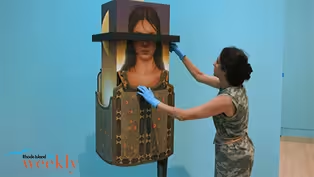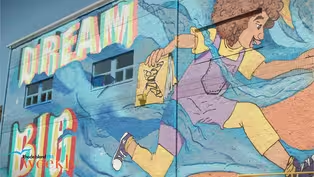
Horse Sense
Clip: Season 4 Episode 40 | 9m 2sVideo has Closed Captions
Visit a farm program for veterans suffering from PTSD that offers healing through horses.
Former service people suffering from post-traumatic stress disorder PTSD have found a haven and healing through horses at a local farm. This non-profit equine therapy program, run by volunteers, emphasizes relaxation techniques to better communicate with the animals and build trust-based relationships. Area veterans share their stories on how handling a horse enables them to handle their emotions
Problems playing video? | Closed Captioning Feedback
Problems playing video? | Closed Captioning Feedback
Rhode Island PBS Weekly is a local public television program presented by Ocean State Media

Horse Sense
Clip: Season 4 Episode 40 | 9m 2sVideo has Closed Captions
Former service people suffering from post-traumatic stress disorder PTSD have found a haven and healing through horses at a local farm. This non-profit equine therapy program, run by volunteers, emphasizes relaxation techniques to better communicate with the animals and build trust-based relationships. Area veterans share their stories on how handling a horse enables them to handle their emotions
Problems playing video? | Closed Captioning Feedback
How to Watch Rhode Island PBS Weekly
Rhode Island PBS Weekly is available to stream on pbs.org and the free PBS App, available on iPhone, Apple TV, Android TV, Android smartphones, Amazon Fire TV, Amazon Fire Tablet, Roku, Samsung Smart TV, and Vizio.
Providing Support for PBS.org
Learn Moreabout PBS online sponsorship- Winston Churchill said, you know the outside of a horse is good for the inside of a person, you know, and it's true.
There is a magic that happens of being around an animal that large with that type of energy.
Thank you.
- [Pamela] Thor Torgersen is one of the founders of a nonprofit organization run out of a horse farm just over the Rhode Island border in Stonington, Connecticut.
It's aimed at assisting veterans who return home from the service troubled and broken.
Mike Warren has been there.
- I wasn't right, I don't, you know, just a lot of bad things done to human people.
You know, a lot of wrong that you would see in a humanitarian situation.
- [Pamela] And Torgersen says he has encountered other veterans like Warren haunted by their tour of duty.
- I have seen individuals who have been homeless, addicted to drugs, incapable of walking on their own without a walker or a wheelchair become fully mobile, off of their addictions, own their own home now, drive, I mean, it's 100% transformation.
We kinda had that anecdotal data of where there have been individuals who told me that they have not ended their lives because of this program.
Start to make your turn 'cause he's gonna wanna walk out.
- [Pamela] This program is called VETS, an acronym for Veteran Equine Therapeutic Services.
This brand of therapy provides healing through horses.
Former service members are invited here free of charge to learn how to handle these highly intuitive 1,500 pound animals.
- Horses are just by nature, the poster child of PTSD.
They have hyper-vigilance, trust issues, fight or flight issues, all of the markers that are traditional PTSD markers.
And that is a survival mechanism.
And we have veterans who come in who have those same issues and you know, when they come in, I kind of jokingly say, "You're just a horse and we can work with that."
- Hold for three.
- [Pamela] How the equine specialists in mental health work is first encouraging veterans to totally unwind, shaking off tension and getting comfortable begins with taking deep breaths to let the horse know you are calm, in control, and a decisive leader.
Torgersen gave me a lesson.
- If you put both hands on him and do that same breathing exercise, you are trying to relax and make him relax by you relaxing.
- [Pamela] Torgersen says because horses are so perceptive, they can sense anger and stress in humans, empathy, compassion and emotional management leads the horse to respond.
The hope is veterans take those skills off the farm and into their lives.
And it doesn't require mounting a horse, just harnessing trust.
- 'Cause if I taught you how to ride a horse and then you never interacted with a horse again, the skill or the experience would be wasted versus coming and get to understand an animal at a very deeper level that makes you understand yourself at a very deep level.
- [Pamela] Torgersen as the program can be transformational by creating a therapeutic environment to ease the isolation of local veterans experiencing combat trauma.
- There are people who have had to see and do things that no one should have to see or do.
You wanna stuff those in the darkest place that you can and many people feel that they can never come back from that darkness.
- Walk on, walk on.
- Mike Warren found himself in that darkness.
He was an 18 year old Marine when he was deployed to the Gulf War.
While on the way, his company was sent to evacuate U.S. citizens from Liberia during its civil war.
- I saw a kid out in the street, he had to be like 11 years old shoot an adult, you know?
And those are just things that you never forget.
- That was Operation Sharp Edge and then another deployment to Iraq.
How did you get diagnosed with PTSD?
What happened to you?
- I didn't know until later.
I ended up going to an alcoholic and drug rehabilitation treatment.
- So you were self-medicating?
- Yeah, I self-medicated, you know, and- - Because, why?
- To try to suppress the feelings that I had of the things that I seen, you know?
And just the relationships.
- How did this program make a difference for you?
- I'm here today because of the program.
- Really?
- Yeah, because I was in the hospital five times for suicide, you know, wanting to commit suicide.
- How did this program change things for you?
- There was a purpose here and being with other veterans and seeing that they had similar situations or similar problems.
You're a good boy, Gump.
- Now Warren volunteers here, not just to care for the horses but also to be there for new veterans entering the program.
Some 100 service people have come through these gates.
Also spending time here are families of veterans.
People like Sara Stepalavich.
What was life like as a military wife?
- It can be lonely sometimes.
- [Pamela] She was a mom with one little boy when her husband put out to sea with the Coast Guard.
- Then we had our youngest with special needs, he has Down syndrome.
And shortly after that he transferred up to Boston and was on a cutter.
And so he'd be gone for a couple months at a time.
- How has being here at the VETS program helped you and your family?
- It's totally, totally changed our lives.
I mean, I like to say that outta something really dark came something really beautiful.
I was at a moment of total crisis.
My oldest is here all the time, he loves coming out here.
My youngest absolutely loves it here.
My husband has benefited from this program.
I mean, this is my second home, this is my second family and I found my voice here.
I've learned how to stand up for myself.
I mean, I found my tribe.
- [Pamela] Stepalavich has also found her calling.
- I am trying to get certified in equine body work and getting hopefully my equine specialist in mental health and learning.
- [Pamela] Warren now believes he has better communication with family and friends.
- At first you were really stressed out but slowly all that stuff, it breaks down.
And you know, I don't know, the horse starts to like bring you down and break you down to, it opens your heart.
He's a good boy, huh?
You're good boy, aren't you?
- [Pamela] Warren loves to tell the story about working in the paddock when this horse named Gump showed his appreciation.
- He came up to me and he put his head right on my shoulder.
You know, I was just cleaning out there.
He put his head right on my shoulder and it just like lowers everything down, you know?
It almost like can bring you to tears.
- [Pamela] Because in this space and at this pace, soldiers who have returned home from war find peace.
- When I'm here, I'm not there, you know what I mean?
When I'm here with the horses, I'm in a different place, tranquil place.
It took a lot of time to get to where I'm at now but you know, it's a lifesaver.
You're a good boy, hmm?
Video has Closed Captions
Clip: S4 Ep40 | 9m 50s | Iranian-born artist puts the oppression of women at the center of her art. (9m 50s)
Video has Closed Captions
Clip: S4 Ep40 | 9m 30s | Three Rhode Island Latinos share how their heritage influences their art and music. (9m 30s)
Providing Support for PBS.org
Learn Moreabout PBS online sponsorship
- News and Public Affairs

Top journalists deliver compelling original analysis of the hour's headlines.

- News and Public Affairs

FRONTLINE is investigative journalism that questions, explains and changes our world.












Support for PBS provided by:
Rhode Island PBS Weekly is a local public television program presented by Ocean State Media

